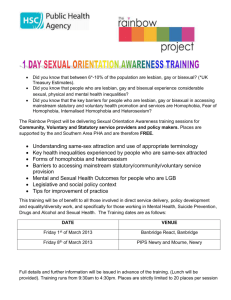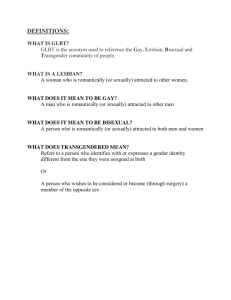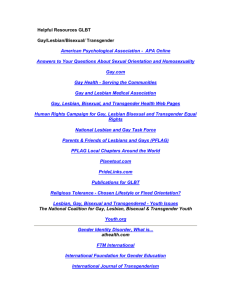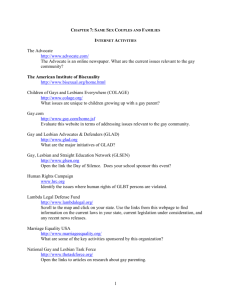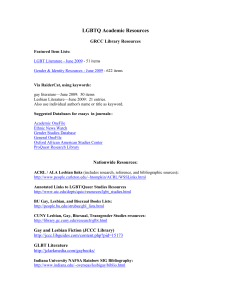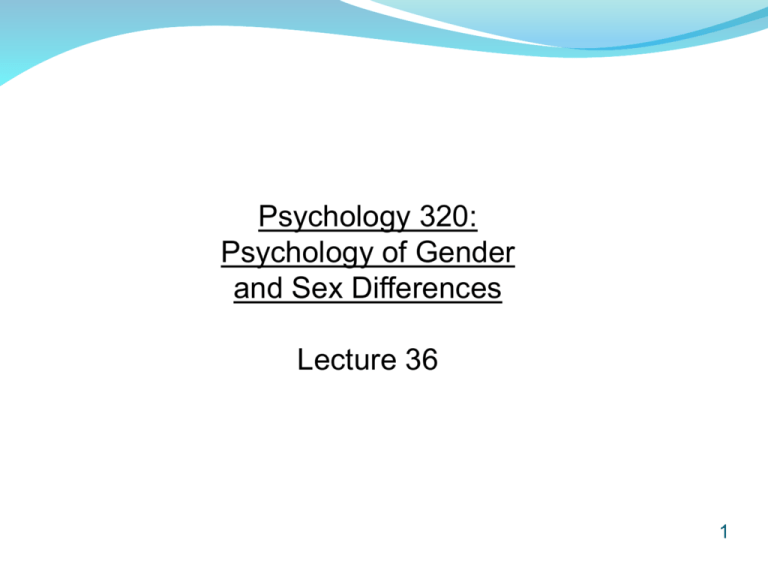
Psychology 320:
Psychology of Gender
and Sex Differences
Lecture 36
1
Office Hour Invitations
January 13th, 11:30-12:30 Kenny 2517
10662070
16925075
18424119
23885098
41735093
74735093
75279091
77033090
2
Announcement
Jackson Katz (from the film
“Tough Guise”) is coming to UBC!
When: Monday, January 23, 6:00 PM - 8:00 PM.
Where: Room 100 of Neville Scarf (2125 Main Mall).
Cost: Free.
More information: http://blogs.ubc.ca/saam/saam-12/.
3
Friendship and Romantic Relationships
1. What unique challenges do cross-sex friendships face?
(continued)
2. What research findings have emerged regarding
friendship among individuals who identify as bisexual,
lesbian, or gay?
3. What characteristics do females and males desire in
a mate?
4
By the end of today’s class, you should be able to:
1. discuss the challenges associated with cross-sex
friendships.
2. compare and contrast friendship among individuals
who identify as heterosexual and individuals who
identify as bisexual, lesbian, or gay.
3. identify sex differences in mate preferences.
4. review theories of sex differences in mate preferences
and the research findings that support them.
5
What unique challenges do cross-sex friendships face?
(continued)
◦ 51% have had sex in the past with a cross-sex friend.
Of these individuals, 56% reported having sex with
more than one cross-sex friend (Afifi & Faulkner,
2000).
◦ 67% of those who have had sex with a cross-sex
friend indicate that the quality of the relationship
improved (Afifi & Faulkner, 2000).
6
◦ Among those who are sexually attracted to a crosssex friend, the primary reasons for not pursuing a
sexual relationship are: avoiding a “break up,” avoiding
being hurt, and avoiding social disapproval (Messman
et al., 2000).
7
What research findings have emerged regarding
friendship among individuals who identify as bisexual,
lesbian, or gay?
• Relatively little research has examined friendship
among individuals who identify as bisexual, lesbian,
or gay.
• This research has demonstrated similarities with and
differences from the findings reported for individuals
who identify as heterosexual.
8
• Similarities include:
Friendship network size.
Desired characteristics: Seek friends with similar
characteristics.
Lesbians and gay males have more friends who are
lesbian or gay than heterosexual; bisexual
individuals have more friends who are heterosexual
than bisexual, lesbian, or gay (Galupo, 2007).
9
Sexual Orientation of Friends Among Lesbians, Gay
Males, and Bisexual Individuals (Galupo, 2007)
10
• Differences include:
Sex differences in self-disclosure and shared activity
are not observed in friendships among gay males
and lesbians (Nardi & Sherrod, 1994).
Sex differences in relationship conflict are not observed
in friendships among gay males and lesbians (Nardi &
Sherrod, 1994).
11
The emotional bond challenge and sexual challenge
manifest in same-sex friendship as opposed to crosssex friendship for individuals who identify as gay or
lesbian.
76% of gay males report having had sex with one or
more close friends; 59% of lesbians report having
had sex with one or more close friends (Nardi, 1992).
12
The emotional bond challenge and sexual challenge
manifest in both same-sex friendship and cross-sex
friendship for individuals who identify as bisexual.
Data regarding the frequency of sex with friends
among individuals who identify as bisexual are not
available.
13
What characteristics do females and males desire in a
mate?
Personal Ads: Women seeking men
Educated, attractive, creative SWF, 29, 5’5” 120 lbs, long brown hair,
seeks articulate SWPM, 29-39, 6’+, gentleman, higher education
(Doctorate/Master’s a must), who enjoys politics, arts, medicine, and
has sense of humour. Multilingual a plus.
SF, 5’3”, 135 lbs, blond/brown, enjoys reading, music, concerts,
hanging out with friends. Seeking SM, with good work ethic, but can
also be romantic, spontaneous, for LTR.
14
Personal Ads: Men seeking women
SM, 29, 6’1”, 190 lbs, enjoys all outdoor athletic activities, stimulating
conversation. Seeking well-built lady, 30-40, with sense of humour.
Redheads a plus.
Seeking attractive, down-to-earth, emotionally well-adjusted SF, late
20s-30s, independent not disinterested, sense of humour. Me:
attractive, tall, fit, educated (master’s) employed, condo/car-owning
SM, 32.
15
• Research suggests that females are more likely than
males to emphasize resource potential, whereas
males are more likely than females to emphasize
physical attractiveness:
16
Effect sizes (Feingold, 1990, 1992; also see Schackelford,
Schmitt & Buss, 2005):
Socioeconomic status: d = -.69.
Ambition: d = -.67.
Physical attractiveness: d = +.54.
17
• Explanations for sex differences in importance of
resource potential and physical attractiveness:
1. Evolutionary explanation: Emphasizes sex differences
in minimal parental investment.
2. Social role explanation: Emphasizes division of labour
between males and females in traditional societies.
18
Friendship and Romantic Relationships
1. What unique challenges do cross-sex friendships face?
(continued)
2. What research findings have emerged regarding
friendship among individuals who identify as bisexual,
lesbian, or gay?
3. What characteristics do females and males desire in
a mate?
19


